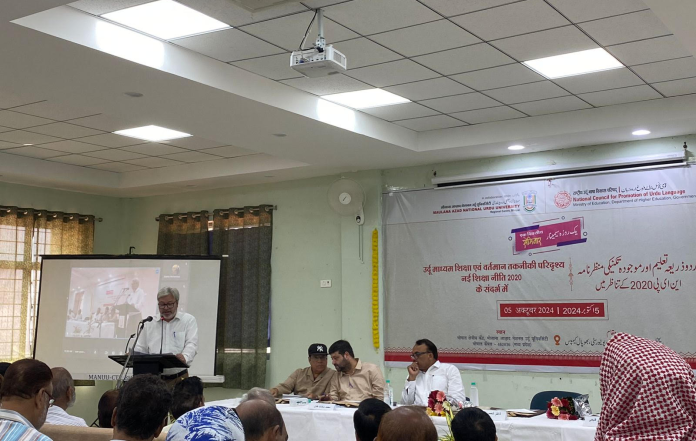Bhopal: A one-day national seminar titled “Urdu as a Medium of Education and the Current Technological Landscape: In the Context of NEP 2020” was held here Saturday, jointly organized by the National Council for Promotion of Urdu Language (NCPUL) and the MANUU Regional Center, Bhopal.
Distinguished linguist and former Head of the Department of Linguistics, Aligarh Muslim University (AMU), Professor A.R. Fatihi, and Registrar of Maulana Azad National Urdu University (MANUU), Professor Ishtiaq Ahmed, were the special guests at the event.
In his opening address, Dr. Shams Iqbal, Director of NCPUL, New Delhi, emphasized the importance of multilingualism in today’s world. He encouraged the participants to not only strengthen their command of Urdu but also of other languages to enhance opportunities. He reassured the attendees that there is no need for disillusionment or pessimism regarding Urdu, as it offers ample job opportunities, second only to English and Hindi. He stressed the importance of aligning Urdu language education with modern demands and making use of new technologies.
Prof. A.R. Fatihi, in his keynote address, highlighted the pervasive role of technology in every field of life.
“With the push of a button, tasks are accomplished. While this brings many conveniences, it also has downsides, as we increasingly rely on technology and diminish our own intellectual capacities,” he stated.
Prof. Fatihi raised concerns about the lack of basic infrastructure in many institutions, posing a challenge to technological advancement. Nevertheless, he encouraged educators and students to dream big and work towards realizing those dreams.
Discussing technology-based teaching, Prof. Fatihi elaborated on TBT (Technology-Based Teaching) and its subtypes, CBT (Computer-Based Teaching) and WBT (Web-Based Teaching), noting how these modes of instruction can be adapted to individual needs.
He also underscored the importance of Instructor-Led Technology, Blended Learning, and Artificial Intelligence (AI) in revolutionizing education. AI, according to him, holds the potential to enable personalized learning and bring about transformative change in the educational field.
However, Prof. Fatihi warned against tampering with the Urdu script in the name of technological advancement, asserting that it could damage the cultural heritage associated with the language.
Joining the seminar online, Prof. Ishtiaq Ahmed expressed concern over the latest decision by the CBSE, which mandates that students can only write answers in Hindi or English. He pointed out that this decision contradicts the principles of NEP 2020, which advocates for education in regional or mother tongues. He cautioned that this move would particularly affect Urdu medium students, including those in MANUU’s model schools in Hyderabad, Darbhanga, and Nuh. Protecting the interests of Urdu medium students, he emphasized, is a collective responsibility.
Dr. Mohammed Ahsan, Director of the MANUU Regional Center, Bhopal, introduced the seminar’s theme, stating that education should aim to address societal gaps and promote economic and social development. He pointed out that in most developed nations, the medium of education has been the mother tongue. In India, professional education is gaining focus, but it is crucial that technical and vocational training be provided in the mother tongue, including Urdu, to empower young people for better employment and entrepreneurship opportunities. He urged that improving the quality of education would also help students secure better jobs more easily.
The inaugural session was moderated by renowned poet and former Secretary of the Madhya Pradesh Urdu Academy, Dr. Iqbal Masood.
The second session was chaired by Prof. Nauman Khan and Prof. Naushad Hussain, with Dr. Neeti Dutta and Dr. Parveen Pandagle as session moderators.
The seminar concluded with a vote of thanks from Dr. Shama Kauser Yazdani, Assistant Director of NCPUL.
Several experts presented papers at the event, including Dr. Talmeez Fatima, Mohammad Sadat Khan, Dr. Zaki Mumtaz, Dr. Feroz Alam, Dr. Bhanu Pratap Pritam, Dr. Indrajit Dutta, Dr. Tanam Khan, Dr. Shabana Ashraf, Dr. Mohammad Hassan, Dr. Sheikh Irfan Jameel, and Dr. Shabbar Ahmed. The seminar was attended by a large number of distinguished guests, university staff, and students.




